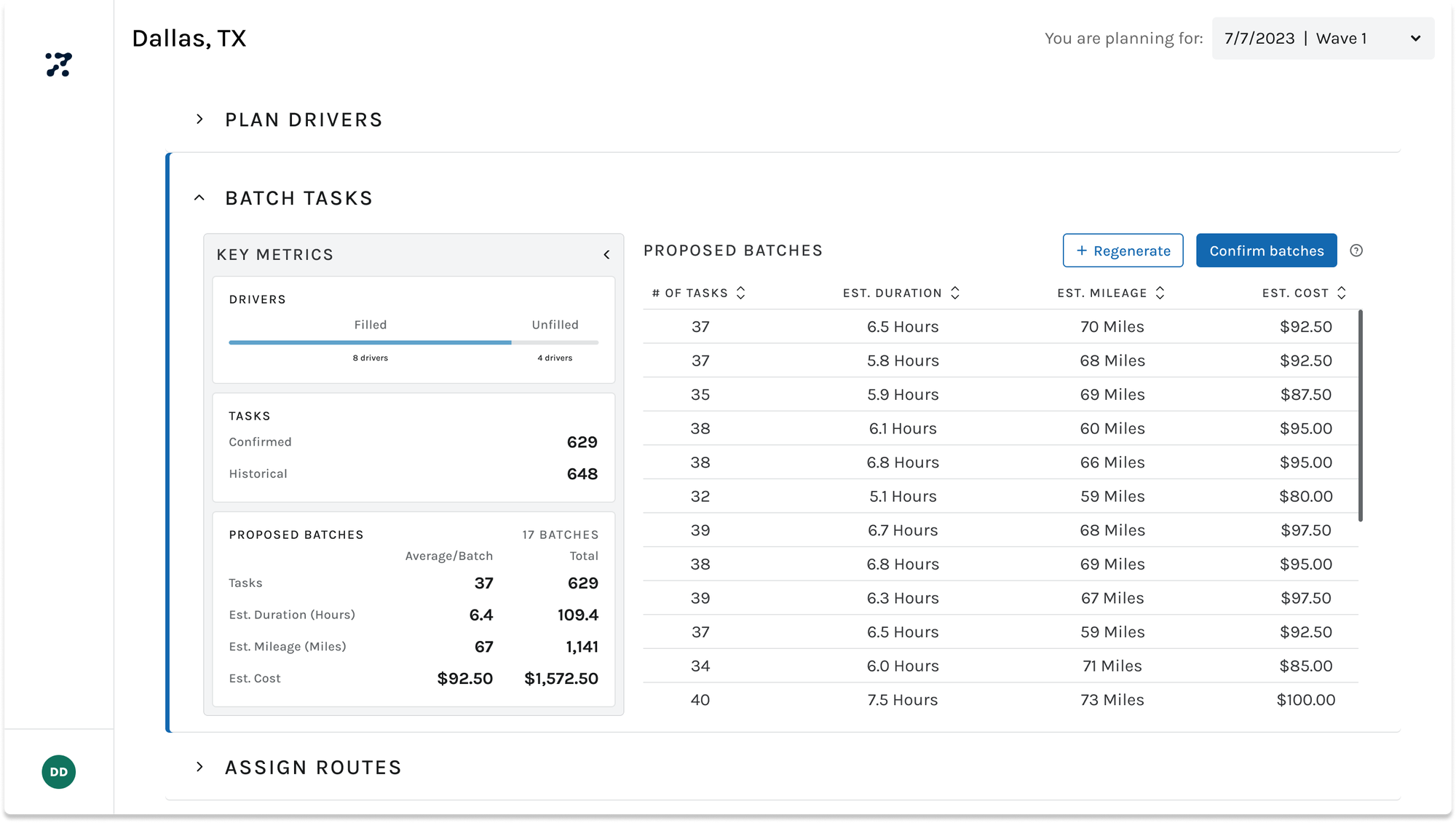The Ultimate Guide to Writing Good Product Requirements
A practical guide for technical founders on how to write clear product requirements that empower your UX/UI designer, accelerate your MVP, and keep your startup on track.

In the fast-paced world of last-mile package delivery, optimizing operations is not just a goal but a necessity for companies striving to stay ahead. Returnmates, a leading player in the industry with a widespread network across the United States, grappled with a significant challenge: manual and unpredictable driver scheduling, a process that drained resources and hindered efficiency.
Enter Zoba, a dynamic startup specializing in data-driven solutions for urban mobility challenges. Zoba partnered with Returnmates to tackle the complexities of driver scheduling head-on. Recognizing the potential for innovation, Zoba enlisted my expertise to collaboratively develop a solution that would automate and optimize driver scheduling for Returnmates.
This case study delves into the collaborative journey between Zoba, Returnmates, and Serif Labs. From identifying the pain points of manual scheduling to the development and implementation of a transformative product, this partnership epitomizes the power of strategic collaboration and user-centered design in addressing real-world challenges. Through a blend of industry expertise, innovative thinking, and cutting-edge technology, Zoba and Serif Labs embarked on a mission to empower Returnmates with a solution poised to revolutionize last-mile logistics and drive sustainable growth in an ever-evolving market.
I was hired as a consultant and lead designer for Zoba’s team. The team had previously worked with a design agency that had delivered a design system. I integrated directly with the team, and worked closely with the head of product and the engineering team to develop product workflows, conduct user research studies, and design build-ready mocks.


I began an extensive research phase to gain a deep understanding of the challenges faced by Returnmantes in the last-mile package delivery landscape. This research encompassed various methodologies, including direct feedback collection from Returnmates' operations managers and immersive visits to Returnmates' warehouse facilities.
During these visits, the team delved into the intricacies of Returnmates' operations. The research uncovered critical insights into forecasting, route optimization, driver management, shift planning, alerts and insights, and warehouse management.
Notable challenges included:
By synthesizing these insights, we gained invaluable perspectives to inform the design and development of a tailored solution aimed at addressing Returnmates' pressing challenges in last-mile logistics.
During the ideation and conceptualization phase, I leveraged design sprints and iterative low-fidelity prototyping to explore and refine solutions tailored to Returnmates' unique challenges in last-mile package delivery.





One key area of focus was enhancing the user experience of the left-hand panel, where operations managers (OMs) typically accessed critical information related to order volumes, shift fill rates, attendance, and delivery success metrics.




Another critical aspect of the conceptualization process revolved around introducing optimization and automation for route batch sizes while preserving user trust and minimizing operational disruptions.
Following the successful conceptualization of design solutions, I transitioned into the implementation phase, leveraging effective collaboration with engineers, efficient utilization of existing components, and proactive communication channels to ensure seamless execution of the project.

To facilitate smooth implementation, I adopted a proactive approach to design communication, utilizing Loom videos to articulate design changes and enhancements effectively. By providing comprehensive explanations and visual demonstrations, the team ensured clarity and alignment across stakeholders, enabling efficient decision-making and rapid progress.

I maintained meticulous version control practices, archiving designs that were discarded or deemed unnecessary for future reference. This approach enabled the team to track design iterations, revisit previous decisions, and maintain continuity throughout the implementation process.
Close collaboration with engineers was integral to the implementation phase. I worked hand-in-hand to leverage existing components available in Storybook, minimizing the need to build custom component. By harnessing pre-existing design elements and components, the team optimized engineering resources, reduced development time, and ensured consistency across the product.

Throughout implementation, I keep my product strategy brain on in identifying design areas where future enhancements could further enhance the user experience. By delineating between immediate requirements and future opportunities for refinement, the team laid the groundwork for iterative improvements and ongoing optimization beyond the MVP launch.
My background as a product manager uniquely suits me for this type of role - I understand the need to think about the true MVP first launch, but also am always thinking about that long term grand picture. As a product designer, being able to stick to my guns on what is truly critical for a user today versus mark everything else as “someday” is one of my superpowers!
After 3 months of iteration and building, the pilot launched in Returnmates' LA market. Results were exceptionally positive: The pilot achieved a remarkable 93% reduction in at-the-door cancellations, a key metric of poor staffing, signifying a substantial improvement in operational efficiency and driver satisfaction. The product’s UX design was incredibly well-received by users, with many commenting on its intuitive layout relative to their other tools.
Zoba continued to iterate on the product and launch future enhancements, with the goal to further automate and optimize last-mile logistics for Returnmates. This project showcases the power of user-centered design, strategic innovation, and seamless implementation in creating solutions that not only meet but exceed the expectations of stakeholders.
Update: Zoba has since been acquired by Marti Technologies (NYSE: MRT)